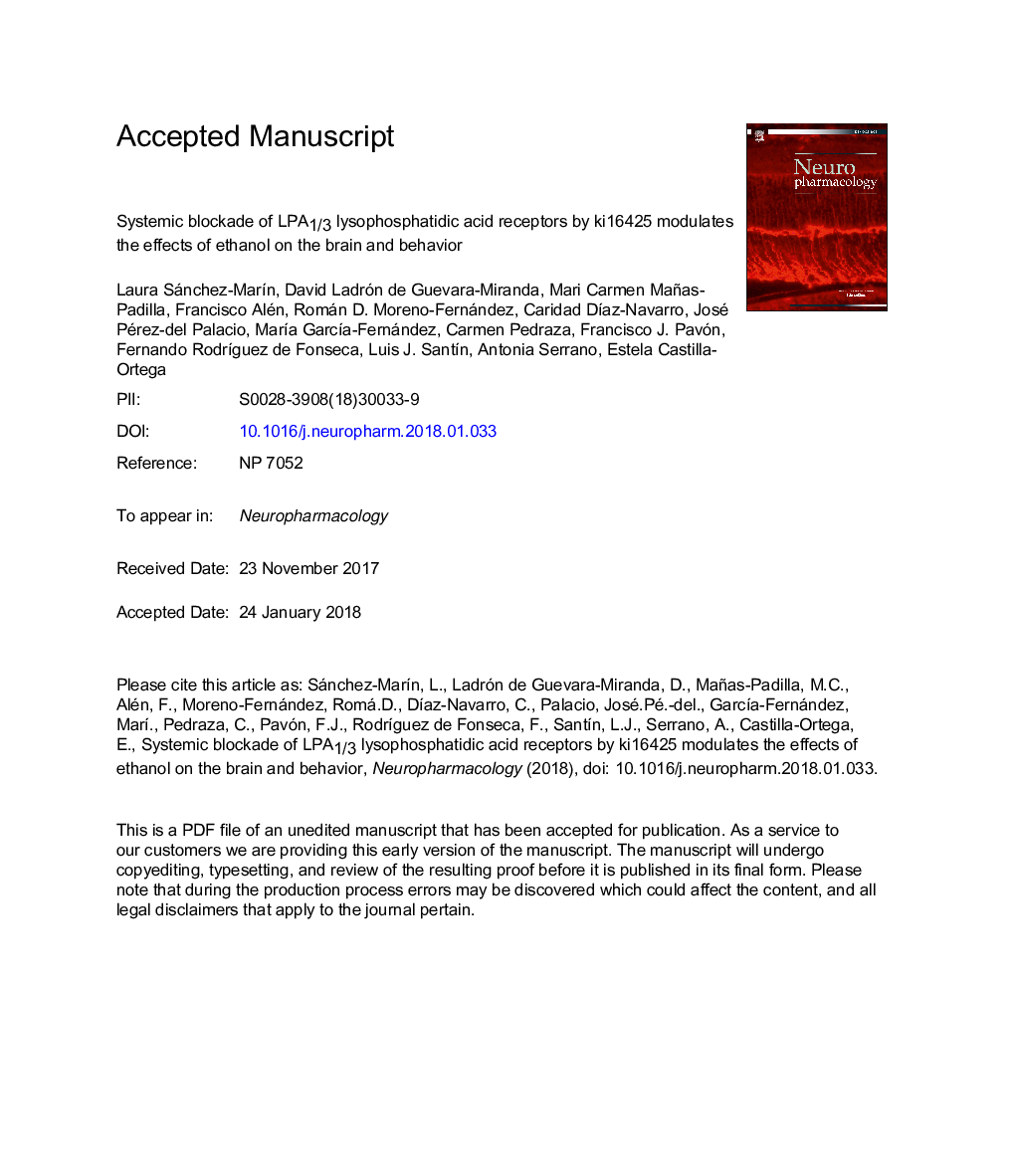| کد مقاله | کد نشریه | سال انتشار | مقاله انگلیسی | نسخه تمام متن |
|---|---|---|---|---|
| 8517003 | 1556584 | 2018 | 26 صفحه PDF | دانلود رایگان |
عنوان انگلیسی مقاله ISI
Systemic blockade of LPA1/3 lysophosphatidic acid receptors by ki16425 modulates the effects of ethanol on the brain and behavior
دانلود مقاله + سفارش ترجمه
دانلود مقاله ISI انگلیسی
رایگان برای ایرانیان
کلمات کلیدی
موضوعات مرتبط
علوم زیستی و بیوفناوری
علم عصب شناسی
علوم اعصاب رفتاری
پیش نمایش صفحه اول مقاله

چکیده انگلیسی
The systemic administration of lysophosphatidic acid (LPA) LPA1/3 receptor antagonists is a promising clinical tool for cancer, sclerosis and fibrosis-related diseases. Since LPA1 receptor-null mice engage in increased ethanol consumption, we evaluated the effects of systemic administration of an LPA1/3 receptor antagonist (intraperitoneal ki16425, 20â¯mg/kg) on ethanol-related behaviors as well as on brain and plasma correlates. Acute administration of ki16425 reduced motivation for ethanol but not for saccharine in ethanol self-administering Wistar rats. Mouse experiments were conducted in two different strains. In Swiss mice, ki16425 treatment reduced both ethanol-induced sedation (loss of righting reflex, LORR) and ethanol reward (escalation in ethanol consumption and ethanol-induced conditioned place preference, CPP). Furthermore, in the CPP-trained Swiss mice, ki16425 prevented the effects of ethanol on basal c-Fos expression in the medial prefrontal cortex and on adult neurogenesis in the hippocampus. In the c57BL6/J mouse strain, however, no effects of ki16425 on LORR or voluntary drinking were observed. The c57BL6/J mouse strain was then evaluated for ethanol withdrawal symptoms, which were attenuated when ethanol was preceded by ki16425 administration. In these animals, ki16425 modulated the expression of glutamate-related genes in brain limbic regions after ethanol exposure; and peripheral LPA signaling was dysregulated by either ki16425 or ethanol. Overall, these results suggest that LPA1/3 receptor antagonists might be a potential new class of drugs that are suitable for treating or preventing alcohol use disorders. A pharmacokinetic study revealed that systemic ki16425 showed poor brain penetration, suggesting the involvement of peripheral events to explain its effects.
ناشر
Database: Elsevier - ScienceDirect (ساینس دایرکت)
Journal: Neuropharmacology - Volume 133, 1 May 2018, Pages 189-201
Journal: Neuropharmacology - Volume 133, 1 May 2018, Pages 189-201
نویسندگان
Laura Sánchez-MarÃn, David Ladrón de Guevara-Miranda, M. Carmen Mañas-Padilla, Francisco Alén, Román D. Moreno-Fernández, Caridad DÃaz-Navarro, José Pérez-del Palacio, MarÃa GarcÃa-Fernández, Carmen Pedraza, Francisco J. Pavón,